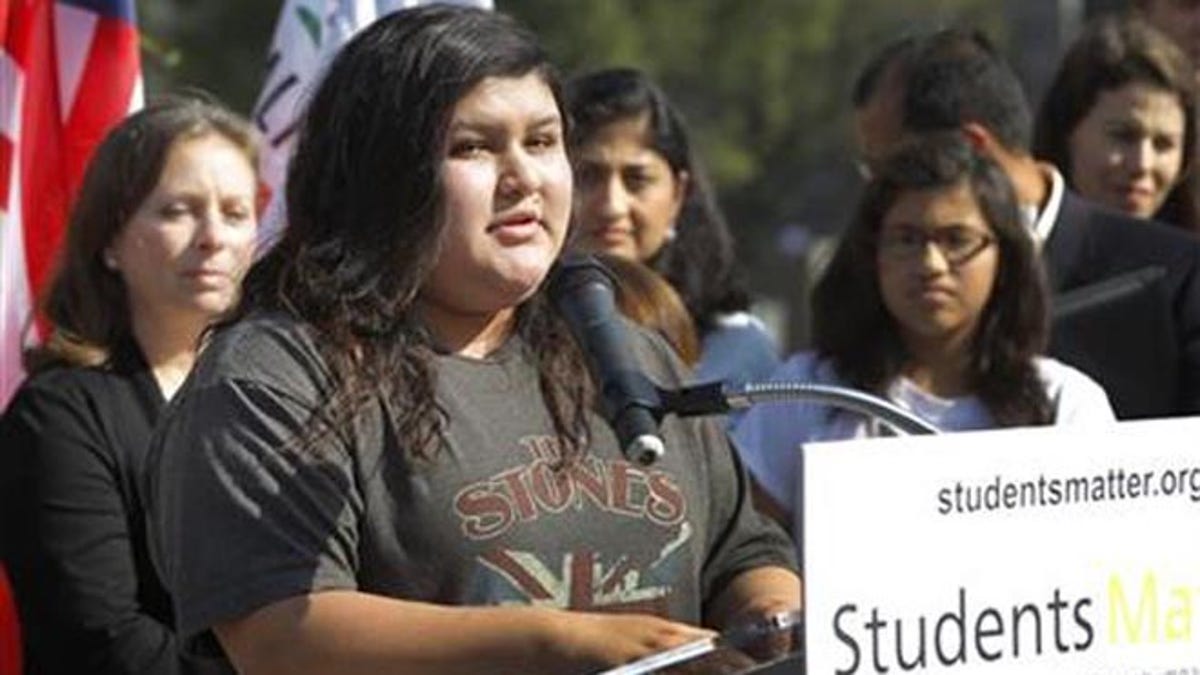
FILE: Jan. 27, 2014: California public school students suing the state to abolish its teacher tenure laws, at a press conference in Los Angeles. (AP)
Teacher tenure looms as a likely hot-button issue in the 2016 presidential races, with several potential GOP candidates in clear opposition to the policy and Democrats largely silent as they try to balance calls for reform and much-needed teachers union support.
Former Florida GOP Gov. Jeb Bush, a favorite among the Republican establishment for the White House job, recently voiced his support for a class-action lawsuit in New York against teacher tenure that was filed Monday. Weeks earlier, a California judge, in a similar case, struck down tenure for the state's public school teachers, ruling in favor of the plaintiffs.
“There will be no equality in education until we transition to a system that prioritizes academic achievement for children over job security for adults,” Bush, chairman of the Foundation for Excellence in Education, said after the New York suit was filed.
The suit essentially challenges the three big concerns about tenure: school districts having to lay off the most senior teachers last, tenure eligibility after only three years and a system that makes firing a teacher nearly impossible.
“When ineffective teachers are allowed to remain in the classroom because of union protections and antiquated laws, it is not only a disservice to students but also to the many wonderful teachers dedicated to excellence in education,” Bush said.
Jessica Levinson, a political analyst and professor at Loyola Law School in Los Angeles, argues that tenure could at the very least be part of the 2016 debate, considering the country’s public education system in general is “always a talking point.”
Moreover, she argues, Americans continue to wrestle with the difficult question: “How do we give our kids a good education while retaining the best people and getting rid of the bad ones?”
Two top-tier, potential Democratic candidates for the White House -- former first lady Hillary Clinton and Vice President Joe Biden -- have made no public statements on the tenure issue, based on research by Fox News of the past 15 years. However, Biden, who is married to a teacher, has spoken often about the importance of teachers.
Besides Bush, two Republican governors in 2012 signed legislation to limit tenure.
Louisiana Gov. Bobby Jindal’s legislation in large part made it harder for teachers to achieve tenure and reworked the appeals process for firings. In February, a judge ruled the tenure-review process was unconstitutional.
New Jersey Gov. Chris Christie, another potential GOP White House 2016 candidate, signed legislation that made it more difficult for public school teachers to achieving tenure and easier to fire under-performing ones.
The new law essentially makes teachers work under a mentor for a year; work four years, not three, to become eligible for tenure; and get high evaluation marks in two consecutive years.
However, Christie failed to achieve what the California suit did and the most recent New York suit attempts to do -- end the “last in, first out” policy in which school districts are required to lay off teachers by seniority, not merit.
The governor’s office did not respond to a request for comment.
The bill arrived on Christie’s desk with unanimous support from a Democrat-controlled legislature -- largely unusual considering Democrats have in recent decades relied to winning elections with the influence, money and grassroots efforts of teachers unions.
Still, they face a sizable electorate -- particularly in older, larger cities – unhappy about the quality of public education and looking at alternatives such as charter schools.
“Liberals and Democrats typically understand that teachers unions will support them,” Levinson said earlier this week. “But it’s definitely a difficult situation for them. They have to thread the needle... Republicans never thought they would get that support.”
The Obama administration issued a carefully worded response to the California judge’s June 10 ruling in which he agreed with the plaintiffs that low-income students are disproportionately impacted by tenure.
“Equal opportunities for learning must include the equal opportunity to be taught by a great teacher,” said Education Secretary Arne Duncan. “The students who brought this lawsuit are, unfortunately, just nine out of millions of young people in America who are disadvantaged by laws, practices and systems that fail to identify and support our best teachers and match them with our neediest students.”
Duncan also said the court decision was a “mandate to fix these problems” but never mentioned tenure.
Still, he drew the ire of the American Federation of Teachers, a major teachers union.
“We needed your leadership,” union President Randi Weingarten told Duncan in a July 10 letter. “But instead, you added to the polarization. And teachers across the country are wondering why the secretary of education thinks that stripping them of their due process is the way to help all children succeed.”




